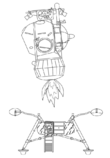Engineering:Zond 4
 | |
| Names | Soyuz 7K-L1 s/n 6 |
|---|---|
| Mission type | Lunar flyby Spacecraft test |
| Operator | OKB-1 |
| COSPAR ID | 1968-013A |
| SATCAT no. | 03134 |
| Spacecraft properties | |
| Bus | Soyuz 7K-L1 |
| Manufacturer | OKB-1 |
| Launch mass | 4,425 kilograms (9,755 lb) |
| Dimensions | 4.5 m x 2.2 m x 2.72 m |
| Start of mission | |
| Launch date | 2 March 1968, 18:29:23 UTC |
| Rocket | Proton-K/D |
| Launch site | Baikonur 81/6 |
| End of mission | |
| Disposal | deorbited/destroyed |
| Decay date | 9 March 1968 |
| Orbital parameters | |
| Reference system | Geocentric |
| Regime | Elliptical orbit |
| Perigee altitude | 200 kilometres (120 mi) |
| Apogee altitude | 400,000 kilometres (250,000 mi) |
| Inclination | 51.53° |
Zond 4, part of the Soviet Zond program and an uncrewed version of Soyuz 7K-L1 crewed Moon-flyby spacecraft, was one of the first Soviet experiments towards crewed circumlunar spaceflight. It was launched to test the spaceworthiness of the new capsule and to gather data about flights in circumterrestrial space. It was the first Soviet spacecraft to possess a computer, the 34 kg Argon 11.[1]
The spacecraft was successfully launched by a Proton D-1e on 2 March 1968 into a 400,000 km apogee orbit 180 degrees away from the Moon.[2] It was launched away from the Moon probably to avoid trajectory complications with lunar gravity. However, on re-entry the L1's guidance system failed. It hit the atmosphere precisely at the calculated time, but was not guided to generate lift and fly out of the atmosphere again. A ballistic re-entry would mean no recovery on Soviet soil, so the APO destruct system automatically blew up the capsule at 10 to 15 km altitude, 180–200 km off the African coast at Guinea.[1]
The Zond 4 flight was in some ways similar to the American Apollo 4 and 6 missions as they were uncrewed test flights in highly elliptical Earth orbits.[3]
References
- ↑ 1.0 1.1 Huntress; Marov (2011). Soviet Robots in the Solar System: Mission Technologies and Discoveries. Springer New York. p. 172. ISBN 9781441978981. https://books.google.com/books?id=rgl_C0XrKTUC.
- ↑ Newkirk, Dennis (1990). Almanac of Soviet Space Flight. Gulf Publishing Company. p. 67. ISBN 9780872018488. https://books.google.com/books?id=QpdTAAAAMAAJ. Retrieved February 10, 2023.
- ↑ Wong, Michael (March 6, 2018). "50 Years Ago: Zond 4 launched successfully". NASA. https://www.nasa.gov/feature/50-years-ago-zond-4-launched-successfully/.
External links
 |


